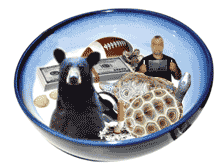 |
|||||||||||
|
|||||||||||
|
|||||||||||
The Maryland General Assembly’s Alphabet SoupBills from A to Z by the spoonfulby Carrie Madren , Bay Weekly senior staff writer A hearty alphabet soup of nearly 2,500 bills has brewed in committees, workgroups and subcommittees of the House and Senate in the General Assembly’s 90-day session that finished April 9. Far fewer bills were served to the full House or Senate; very few made it all the way to the governor’s table. Maryland’s legislative alphabet ranged from cloning to clams, right-of-way to ravens. In this ladleful of 26 bills scooped from the full pot, we sample the issues — life-changing to little, headliners to footnoters — we pay $69,127,622 for our lawmakers to consider. Alcohol Without Liquid vending machines won’t come to Maryland this year — or, we hope, any other. The unregulated machines, popular in Europe and Asia, serve up alcohol vapors at a 10 times higher concentration than a cocktail of same amount of alcohol. Sniffers, however, supposedly suffer lighter hangovers. In both the House and Senate, only one lawmaker, sponsoring Del. Warren Miller from Howard County, voted for the machines. Some 21 other states, including California, New York, Tennessee and Virginia, have already outlawed them. Black bears won’t be introduced into each county in the state, though in response to hunting bans introduced each year, Del. Wendell Beitzel and 11 other sponsors suggested sharing Western Maryland’s bruins with the bear-loving rest of the state. The Share the Bear bill would have required DNR to introduce black bears into each Maryland county by October 1, 2014. Clam dredgers will have to give up their hydraulic dredges in Atlantic coastal bays, though not in the Chesapeake. Hydraulic dredging, which works a little like vacuuming, is hard on bay bottoms and creatures. But the remedy is hard on watermen, another species endangered by degradation of state waters. Diamondback terrapins stay out of Chinese soup pots after legislators voted to ban commercial harvesting of our state reptile. The captured terps — 10,278 last year after Maryland Department of Natural Resources’ 2006 harvesting regulations backfired — were exported to China, where turtle meat is in high demand. English is Maryland’s most spoken but not its official language, since Senate Bill 943 was voted down in the Senate’s Education Health and Environmental Affairs committee. The official language bill would have legislated English as the language of public meetings as well as official government business. Felons will regain the right to vote after they have completed their sentences and any parole requirements. Until this year’s Voter Registration Protection Act, conviction of a felony meant automatic, life-long disenfranchisement. Maryland becomes the 37th state to restore voting after felons’ debt to society is fully repaid. Green Fund fees would have inspired more environmentally friendly buildings and construction by levying flat fees ranging from $100 to $1,500 for development adding new impervious surfaces, where rainwater cannot filter into the ground. The Green Fund would also have paid for reducing nutrient runoff into rivers by putting money into DNR’s under-funded Tributary Strategies’ restorations. The Green Fund passed the House, where it was supported by Environmental Matters Chair Del. Maggie McIntosh. The Senate voted it down on the last day of session. Human cloning would have been outlawed if the Human Cloning Prohibition Act of 2007 had passed. The ban would have prohibited us from cloning — or attempting to clone — ourselves or another human. So there’s still hope for a future twin. Insurance giant Allstate and other insurers are free to refuse new policies to dwellers in coastal areas, where global warming could mean more frequent flooding. The Senate killed a bill to spike Allstate’s plan, opening the floodgates to more restrictive insurance practices. Jaws of steel won’t be banned from animal traps, as Senate Bill 822 didn’t move out of the Senate Education, Health and Environment committee this year. Animal rights and wildlife groups asked for the ban, asserting that such steel-jawed leg-hold traps are inhumane. Kicking the habit — smoking, that is — might not be a bad idea now that the Clean Indoor Air Act of 2007 passed. No longer can smokers light up in indoor areas open to the public — including bars and restaurants — and indoor places of employment, or they’ll face fines. Bars and restaurants were targeted this year, as smoking in other workplaces was prohibited in 1995. Lyme disease and other tick-borne illnesses were almost in the spotlight, but a bill passed by the House didn’t graduate to the Senate. If the measure had made it, the Secretary of Health and Mental Hygiene would have had to launch a public awareness campaign on the difficult-to-diagnose disease. Opponents of the bill complain that it suggests only one of two widely recognized treatment options, thus limiting patients’ choices. Milk drinkers — who enjoy our official state beverage — still won’t be able to buy fresh milk directly from farmers, as a bill to lift a current ban was withdrawn. Maryland law prohibits consumers from buying raw and unpasturized milk and milk products from farmers or milk producers directly. Nonresident tuition — thousands of dollars higher than in-state tuition, a difference of $14,239 at University of Maryland College Park — will still be charged to immigrant students lacking official Maryland resident status at Maryland state universities and colleges. A bill killed in the Senate would have exempted Maryland high school graduates — regardless of immigration status, including undocumented aliens — from paying the higher tuition. Current law says that to pay the lower resident rates, a student must have been a permanent resident of Maryland for 12 months prior for universities and three months for community colleges. Oysters get a small boost for survival with a restoration bill passed this year. The governor’s Oyster Restoration Bill will form an oyster committee to advise Maryland Department of Natural Resources. Under the bill, as well, non-profits can lease Bay bottom acreage to raise oysters to help restore the native species, which is now estimated at only one percent of its historic level. Leaseholders will have to plant at least 250,000 oysters at a density of a million oysters per acre. Poachers and pirates will also pay higher penalties for breaking oyster-harvesting laws. As Gov. Martin O’Malley asked for the bill, he’s 99 and 44⁄100 percent likely to sign it. Popular votes might decide future presidential elections if other states join Maryland in passing a bill to award electoral votes to the nation’s popular vote winner. In the current Electoral College system of 538 votes, it’s possible for a candidate to win an election — as George W. Bush did in 2000 — without winning a majority of popular votes. Constitutionally, states have power to award their Electoral College votes as they choose. As the first state to pass the National Popular Vote bill, Maryland — with 10 Electoral College votes — gets the ball rolling. But to take effect, this national compact requires other states to sign on, enough to equal an Electoral College majority, or at least 270 votes. Similar bills have been introduced in 22 other states, but only in Hawaii has such a bill made it to the governor’s desk. Queen Anne’s County still has to pay the 24-cent-per-gallon state motor fuel tax on biodiesel fuel in government vehicles and school buses. Sen. E.J. Pipkin couldn’t convince his colleagues in the Budget and Taxation committee to pass the bill, which would have helped his county vehicles to afford the more expensive biodiesel. Ravens won’t become Maryland’s second official state bird, backing up to the Baltimore oriole, as House Bill 752 couldn’t take flight out of committee. Del. Nathaniel Oaks introduced the bill so that the Baltimore Ravens football team could boast its mascot as a state bird, as do the Baltimore Orioles. Sassafras sandy loam would have been our official State soil if House Bill 471 hadn’t been buried in committee. This farming-friendly soil covers more land area than any other soil in Maryland. Maryland now has a state bird (oriole), dog (Chesapeake Bay retriever), reptile (terrapin), flower (black-eyed Susan), sport (jousting), team sport (lacrosse), drink (milk), cat (calico) and dance (square dance). But we don’t have a state soil. Traffic won’t have to yield to people dodging cars in parking lots. A pedestrian right-of-way bill, introduced by Del. Michael Smigiel Sr., would have required drivers to yield right-of-way to walkers in parking lots. Alas, it didn’t pass the Environmental Matters committee. Unemployment insurance benefits will increase from a maximum of $340 to $380 each week for the unemployed, as a bill passed both the House and the Senate. Voters will choose their presidential candidates — plus representatives in Congress, State Judges of the Circuit Court, Court of Special Appeals and Court of Appeals, and delegates for party national conventions — three weeks earlier than the planned March 4 primary election, after a new law bumped up our first round of voting to February 12, 2008. Senate Bill 1025 and House Bill 1434, both of which passed last week, hope to bring more contenders to Maryland and give Marylanders clout in picking the nominees. But nine months is a long time to hear all about the same candidates. Wetland developers won’t have to pay a $1,000 fee per square foot that they develop, after Del. Sue Kullen’s bill sank in committee. The hefty measure would have deterred developers from building on sensitive lands. Kullen admits the bill has a long way to go and wasn’t ready for a vote this year. X-Rated faux animal anatomy can still dangle from the back of Maryland pickup trucks, though Del. LeRoy Myers, Jr. tried to outlaw the plastic privates. The latest trucker fad — to attach rubber bull testicles to the hitch of their vehicle — wasn’t quashed by Myers’ attempts to make the road more G-rated. Young scouts who earn their Eagle Scout or Girl Scout Gold Award would have been eligible for a slice of $200,000 in scholarship money authorized HB 1303 and SB 980. The bills didn’t make it out of committee, so the Scouts will have to use their merit badge skills to figure out how to pay for their higher education. Zeroing out car emissions may be in our future now that the Clean Cars Act will become law. Third time’s the charm, for this three-year-old bill that will raise our standards to match those of progressive California’s, requiring car dealers to sell more clean cars, like hybrids and cars that run on alternative fuels. The Clean Cars Act, according to Environment Maryland, will curb global warming pollution by 4.4 million tons per year by 2016, when the law takes full effect. That’s a 20 to 30 percent reduction of dangerous air pollutants in Maryland, according to the Maryland Green Party. Not only will our air be cleaner, but we’ll also consume less fuel, moving a step closer to energy independence. |
|||||||||||
|
|||||||||||
|
|
|||||||||||
|
© COPYRIGHT 2007 by New Bay Enterprises, Inc. All rights reserved. |
|||||||||||


